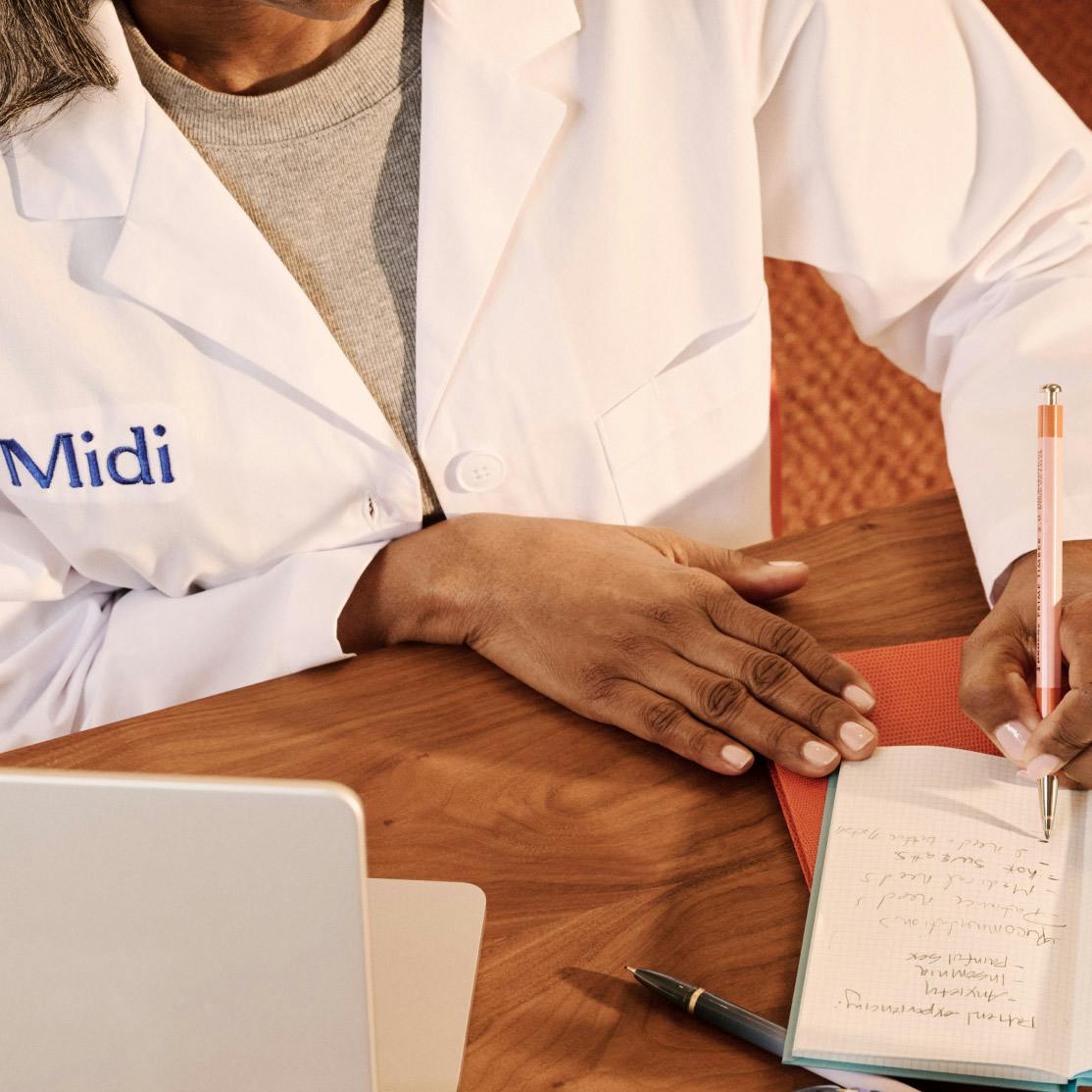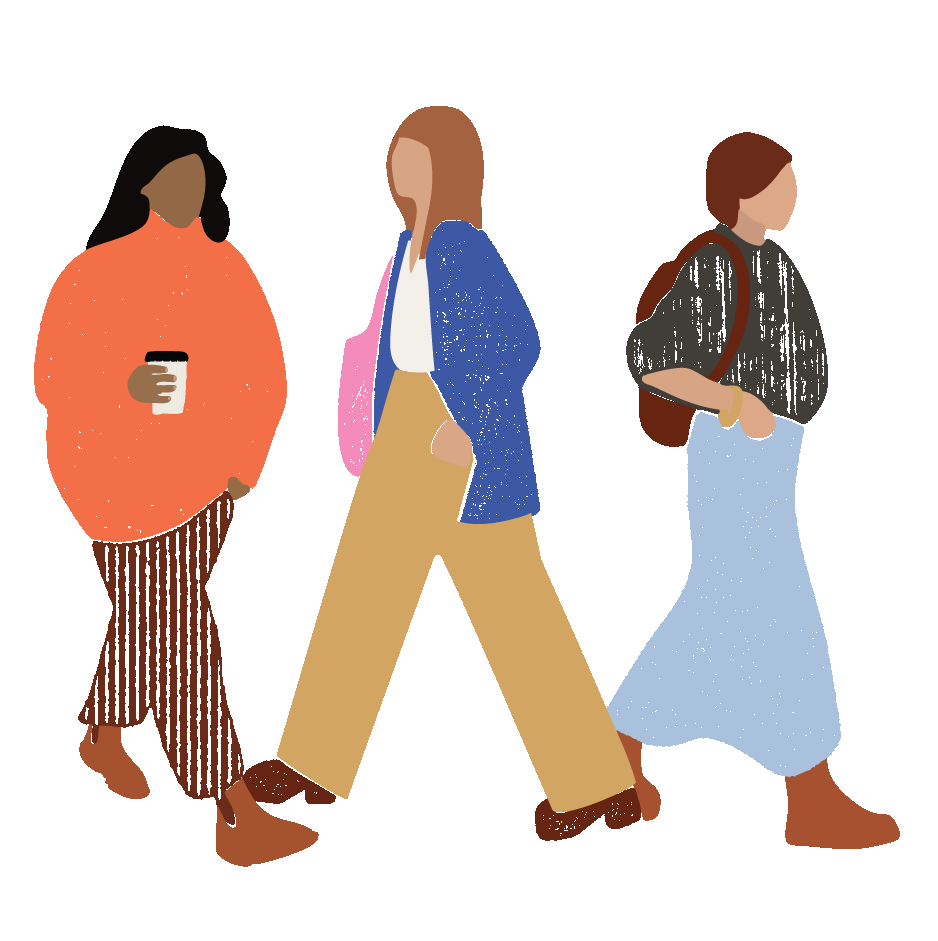While menopause timing is largely determined by genetics, factors like smoking, diet, chemotherapy, and surgery can play a role in early onset. Hormone replacement therapy (HRT) won’t delay menopause, but it can ease symptoms and improve the transition. Plus, new treatments on the horizon might one day impact fertility and lifespan.
Lately, there’s been a lot more chatter about menopause, from national news articles to informative TikToks. On the one hand, it’s a topic long overdue for mainstream attention and open, honest conversation. On the other, it’s a bit depressing! Once you get a whiff of all those less-than-fun menopausal symptoms, we can’t blame you for Googling “how to delay menopause” in the middle of the night. Who wouldn’t want to keep hot flashes, brain fog, bone-deep fatigue, and a depleted sex drive at bay for as long as possible? It’s understandable, and while it may not be possible yet, delaying menopause could be within reach sooner than you might think. And science has good reason to explore the possibility.
The average woman enters menopause at age 51. In the four to 10 years leading up to your periods ending for good (a phase known as perimenopause) and the years immediately following (post-menopause), your body and brain will undergo a slew of physiologic changes with the power to alter the trajectory of your health. That includes significant upticks in risk for future heart disease, dementia, osteoporosis, pelvic floor disorders, and more. The link: Declining levels of sex hormones like estrogen and progesterone, which are directly and indirectly involved in the functioning of nearly every tissue in the body.

So the question of how to delay menopause may actually be more of a proxy for a more basic question: How can you live both longer and healthier? “We do know that later menopause is associated with improved longevity in women, and we know that female hormones have many positive health benefits, so it makes sense to explore ways to delay menopause as a potential avenue to support women’s health,” says Kathleen Jordan, MD, Chief Medical Officer at Midi Health.
Read on to learn about the potential benefits of later-onset menopause and some strategies you can use to potentially move the needle.
Understanding Menopause and Its Timing: The Ages and Changes
Perimenopause is sometimes referred to as “puberty in reverse,” a reference to the hormonal swings that color moods, impact health, and signal the end of the reproductive period. Estrogen and progesterone levels start low in puberty before taking off on an up-and-down roller coaster ride, ultimately settling at a place of relative hormonal stability. In contrast, estrogen and progesterone levels start high in early perimenopause and slowly taper off, following a similar spike-and-dip trajectory known for triggering puberty-esque symptoms like weight gain, acne, and nearly all of the emotions depicted in Inside Out 2. (Anger, sadness, and anxiety, to name a few.) Many women also experience hot flashes and night sweats, sleep disruption, vaginal dryness, and libido changes in perimenopause.
Periods fluctuate, often wildly so, throughout perimenopause before eventually stopping. When a woman has gone 12 months without a period, she is considered to be in menopause. This final full stop of your periods means your ovaries have mostly stopped producing estrogen and progesterone.

For most women, perimenopause starts in the early- to mid-40s and lasts about four to 10 years. As mentioned, 51 is the average age of menopause in the U.S.; most women will see the Big M between 45 and 58. If you experience signs of perimenopause under age 40, see your doctor for an exam.
Estrogen, in particular, is a master hormonal regulator, and the ovaries utilize it to carry on “a complex chemical conversation with the rest of the body,” explains Jennifer Garrison, PhD, one of the world’s top experts in the intersection of reproductive aging and longevity and co-founder and executive director of productivehealth.org. “It’s not just about baby-making; the ovaries send signals to almost every tissue in a woman’s body. We really don’t understand how it works, but we do understand what happens when it doesn’t work.”
How the Menopause Transition Affects Your Entire Body
When ovarian production of estrogen ceases in menopause, the organs go through a withdrawal of sorts, leading to critical health consequences all throughout the body, including (but not limited to) these:

- Brain: Estrogen is neuroprotective, which helps explain why between 40% and 65% of women report memory issues (brain fog, familiar words that go missing mid-sentencel, slower processing speed) in midlife. Menopausal estrogen loss is a crucial reason one in five women will develop Alzheimer’s disease—a risk twice as high as men.
- Heart: Women in their 20s and 30s have a lower risk of heart disease than men, attributable primarily to estrogen’s beneficial effects on blood pressure, the health of your arteries, and cholesterol levels. Post-menopause, heart disease risk rises dramatically, with upticks in cholesterol, triglycerides, and heart attack risk.
- Bones: Estrogen promotes new bone growth; declining levels accelerate the loss of bone density in midlife, leaving women vulnerable to osteoporosis and fractures.
- Mood: Estrogen collaborates with the nervous system to produce brain chemicals called neurotransmitters that are essential for emotional regulation and mood stabilization. The production of the “feel good” brain chemical serotonin depends in part on estrogen, and when levels dip, this can lead to anxiety and depression. In fact, as many as 70% of menopausal women say they experience mood swings.
Why Ask “Can You Delay Menopause?”
Research linking menopause with the acceleration of health issues has opened the eyes of experts and everyone who’s curious about female longevity and wellness. The ovaries’ role as the “architects of health and the pacemakers of aging in women’s bodies,” in Garrison’s words, has us all wondering if delaying menopause might put millions of women on track for longer, stronger lives.
The spotlight, she says, is not so much on life span (the number of years a person is alive), but health span, defined as the number of years a person enjoys good health and wellness. In fact, Garrison, who is also an Adjunct Assistant professor at the University of Southern California Leonard Davis School of Gerontology, says she now shies away from the phrase “delay menopause,” as she feels it subconsciously limits the focus to menstruation and the ability to conceive. “Fertility is a downstream consequence,” she acknowledges (more on that to come), “but it’s [more] about preserving the endocrine function of the ovaries.” Her goal, she says, “is to refocus all of women’s health through the lens of ovarian functioning.”
The notion that delaying menopause could protect women’s health is bolstered by what we know about the health risks of early menopause (menopause that occurs between ages 40 and 45) and premature menopause (menopause that occurs before age 40.)
Potential culprits behind premature or early menopause include:
- Smoking
- Surgical removal of both ovaries
- Chemotherapy and/or radiation
- A family history of premature or early menopause
- Chronic stress, especially trauma resulting from being on the receiving end of racism or any experience which leads to Post-Traumatic Stress Disorder (PTSD)
- Certain diseases and infections, including autoimmune-related thyroid disease and rheumatoid arthritis
About 5% of U.S. women go through early menopause and 1% go through premature menopause. These women face even greater risks of heart disease, osteoporosis, dementia, and more compared with women who reach natural menopause, and it’s almost entirely due to the early loss of the protective benefits of estrogen.
The Three Best Lifestyle Changes That May Help Delay Menopause
Like eye color or shoe size, you don’t get to choose the age you hit menopause.
Genetics are a big driver here, to be sure: The age at which your mother hit menopause is generally considered a good predictor of when you will yourself. But the day you enter menopause—when you’ve gone exactly 12 consecutive months without a period—is also influenced by lifestyle and environmental factors.
How big of an impact the following lifestyle factors can make is difficult to pin down, but one thing we know for sure, Garrison says, is that “if it impacts aging in the rest of the body, it impacts ovarian aging.” Evidence points to these as potential menopause-delayers:
Avoiding Smoking
Smokers are more likely to see any dreams of a later menopause go up in, yes, smoke. Nicotine and other components of cigarette smoke exert toxic effects on the ovaries, including directly harming eggs and interfering with critical sex hormone conversion processes. Data from the Nurses’ Health Study II, one of the largest investigations into the risk factors of major chronic diseases in women, revealed a nearly two-fold increased risk of early menopause (menopause before age 45) among current smokers compared with never-smokers. Current smokers also faced an elevated risk of premature menopause (menopause before 40.)
Smoking has such a major impact that, per a 2022 UK study, if your mother smoked while you were in utero, you’re more likely to experience early menopause yourself.
Giving birth and breastfeeding
In a JAMA Network Open study that looked at the pregnancy and breastfeeding history of more than 100,000 premenopausal women between ages 25 and 42, researchers found that women with one, two, or three full-term pregnancies had an 8%, 16%, and 22% lower risk of early menopause, respectively, compared with those who had never been pregnant or had been pregnant for less than six months. Those who exclusively nursed a baby (meaning only breast milk—and no other food or liquids, including water) for seven to 12 months enjoyed the lowest odds of early menopause.
What’s the connection? We’re born with our ovaries already containing all of the eggs we’ll ever produce—about a million, according to Kara Goldman, MD, Director of Fertility Preservation at Northwestern Fertility and Reproductive Medicine in Chicago. Once you get your first period and start ovulating, you can typically expect to release one egg a month until menopause. The rest are naturally lost and absorbed within the ovary. Should an egg become fertilized, kicking off pregnancy, the ovaries stop releasing any more eggs until the baby is delivered. If a mom exclusively breastfeeds, the hormonal changes that go along with it usually continue to prevent ovulation until she stops. Because, as the JAMA Network Open authors write, pregnancy and breastfeeding both “slow the depletion of the ovarian follicle pool,” more eggs remain in the ovaries for more extended time periods, which may push menopause off a little later.
Prioritizing a nutrient-dense diet
You are what you eat, and that includes your ovaries. A Journal of Epidemiology and Community Health study highlighted this fact when researchers noted that women who regularly consumed certain nutrient-dense foods and vitamins entered menopause at a later age:

- Every daily serving of fatty fish a woman consumed was associated with a 3.3-year delay in the start of menopause.
- Every daily serving of beans or legumes was associated with a 0.9-year delay in the start of menopause.
- Higher intakes of vitamin B6 and zinc were linked with a later age at natural menopause (about 0.6 years and 0.3 years, respectively).
- Higher intakes of refined pasta and rice fans were associated with hitting menopause 1.5 years earlier.
The study authors hypothesized that the omega-3 fatty acids in the fish and antioxidants in the beans might help preserve the follicles in a woman’s ovaries. As for the refined carbohydrates in pasta and rice, their effect on blood sugar levels and insulin resistance (which in turn interferes with certain hormonal processes) could be to blame for moving up menopause timing.
Can Hormone Replacement Therapy Delay Menopause?
Taking hormones won’t delay menopause, but it can make for a far smoother transition while also helping to mitigate the health aftershocks of this major hormonal shift. “Hormone replacement therapy,” Dr. Jordan says, “can be a means to support these same goals.”
Hormone Replacement Therapy (HRT), sometimes referred to as menopausal hormone therapy or MHT, is effective at easing many bothersome menopause symptoms, including hot flashes and night sweats, vaginal dryness, mood swings, brain fog, and more. Technically, the phrase “hormone replacement therapy” is misleading, though, as the patches, pills, creams, gels, and other methods used supplement hormones lost during the transition to natural menopause—it’s not a complete replacement.
For women in premature or early menopause, HRT can truly be a necessity. Consider HRT’s effect on osteoporosis, for example. Research consistently shows that supplemental estrogen and progesterone (or estrogen alone, which is often the recommendation for women who’ve had their uterus removed) helps maintain or increase bone mineral density; lowers the risk of osteoporosis-related fractures; and can prevent postmenopausal osteoporosis. So while you’re not delaying menopause, so to speak, you may be able to delay or lessen some of its harshest effects.
You can work with a trained healthcare professional, like a Midi clinician, to decide whether HRT is right for you and choose the form that best fits your health history, symptoms, and goals.
Will We Be Able to Delay Menopause in the Future?
Until science answers the golden question—“Why do the ovaries age so much faster than the rest of the human body?”—Garrison says lifestyle practices and hormonal therapy are the main tools available to women interested in optimizing health span. But exciting possibilities lay ahead:
Rapamycin
Rapamycin is an immunosuppressive drug primarily used to prevent rejection in organ transplant recipients, and researchers are now looking at it as a way of slowing ovarian aging.
Columbia University researchers are investigating the use of Rapamycin in healthy women as a way to extend not just fertility, but health span. Early results of their work have made a splash in the headlines, but Dr. Goldman recommends maintaining cautious optimism until more human research is done. Still, she says, Rapamycin “can have important implications for fertility, ovarian health, and systemic health. The idea is that if we can slow the activation of follicles in the ovaries, we can protect follicles, and thus protect the hormones essential for bone, brain, and cardiac health, for longer periods.”
Cryopreservation
To extend fertility, there are a few options that involve a deep freeze. Elective oocyte cryopreservation—aka freezing your eggs—essentially hits the pause button on age-related fertility decline. Egg freezing continues to gain in popularity. There were nearly 30,000 egg-freezing cycles in the U.S. in 2022, up from 24,560 in 2021. The technology essentially hits the pause button on age-related fertility decline.
There’s also another fertility extender: ovarian tissue cryopreservation, in which the ovary is removed and the outer layer (the cortex, which contains the egg follicles) is frozen. This process has long been used in the cancer world, to help prepubertal girls protect their ovaries before cancer treatment. “A patient can come back in 5, 10, even 20 years and have the tissue reimplanted in her pelvis, to resume typical ovarian functioning,” says Dr. Goldman.
The Takeaway
- Declining levels of estrogen and progesterone during menopause can affect almost every system in your body, which may make you wonder if putting off the entire transition can help you live healthier (as well as longer).
- Early menopause can be caused by things like smoking, surgical removal of both ovaries, chemotherapy and/or radiation, and a family history of early menopause.
- While genetics tend to be the biggest predictor of when you may go into menopause, there are lifestyle factors (not smoking, eating a healthy diet) can help prevent earlier onset.
- Hormone replacement therapy (HRT) can’t delay menopause but it can make the transition smoother and tamp down troublesome symptoms.
- There are some intriguing treatments on the horizon that may impact the length of fertility and overall lifespan.
If you’re in perimenopause or menopause and want guidance from clinicians who specialize in women’s midlife health, book a virtual visit with Midi today.
Hormonal change is at the root of dozens of symptoms women experience in the years before and after their period stops.
Our trained menopause specialists can help you connect the dots to guide you towards safe, effective solutions.
Whether you need personalized guidance or a prescription routine to tackle symptoms—including brain fog, hot flashes, sleep trouble, mood swings, and weight gain—we’ve got you covered.
Midi’s mission is to revolutionize healthcare for women at midlife, wherever they live and whatever their health story. We believe that starts with education, to help all of us understand our always-changing bodies and health needs. Our core values guide everything we do, including standards that ensure the quality and trustworthiness of our content and editorial processes. We’re committed to providing information that is up-to-date, accurate, and relies on evidence-based research and peer-reviewed journals. For more details on our editorial process, see here.
 Leslie Goldman, MPH
Leslie Goldman, MPH
 Marissa Fontanez, DNP, FNP, FAIHM, MSCP
Marissa Fontanez, DNP, FNP, FAIHM, MSCP




